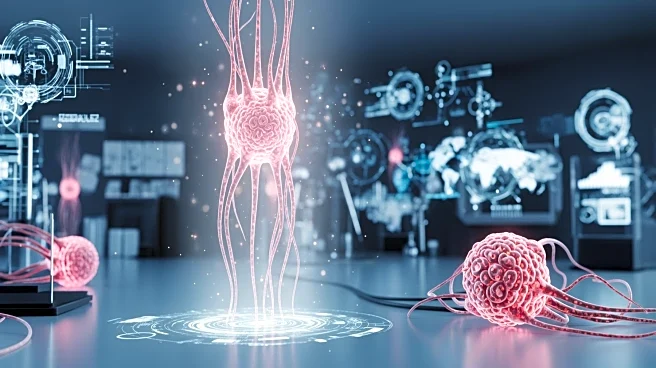What's Happening?
Leading scientists and bioethicists are advocating for the establishment of an international oversight body to monitor advancements in the field of human neural organoids. These lab-created structures,
made from human stem cells, have shown significant potential in mimicking brain functions and aiding in the study of psychiatric and neurological diseases. However, their increasing complexity has raised ethical concerns, particularly regarding the rights of cell donors and the implications of integrating human organoids into animal brains. The call for oversight comes as U.S. government agencies, including the National Institutes of Health, are investing in organoid research to accelerate drug discovery and reduce reliance on animal testing.
Why It's Important?
The development of neural organoids represents a significant advancement in medical research, offering new insights into brain diseases and potential treatments. However, the ethical implications of this technology are profound, as it challenges existing norms regarding human rights and animal welfare. The establishment of a global oversight body could ensure responsible research practices and address concerns about the potential sentience of organoids. This oversight is crucial as the field expands, with more researchers entering the domain and the technology advancing rapidly. The outcome of this initiative could shape the future of neuroscience and bioethics, impacting drug development and research methodologies.
What's Next?
A conference organized by Stanford University and the Dana Foundation will gather experts to discuss the ethical, legal, and societal dimensions of neural organoid research. This event aims to foster dialogue among scientists, bioethicists, legal scholars, and policymakers, potentially leading to the creation of a dedicated oversight body. The discussions may influence future regulations and guidelines, ensuring that the rapid advancements in organoid research are conducted ethically and responsibly. The conference's outcomes could pave the way for new standards in the field, balancing scientific progress with ethical considerations.
Beyond the Headlines
The ethical debate surrounding neural organoids touches on broader issues of scientific self-regulation and the potential for unforeseen consequences in biotechnology. As researchers explore the integration of human cells into animal brains, questions arise about the implications for animal cognition and capabilities. Additionally, the possibility of organoids achieving sentience, though currently remote, challenges existing ethical frameworks. These discussions highlight the need for proactive measures to address potential ethical dilemmas before they become critical issues, ensuring that scientific advancements align with societal values.










